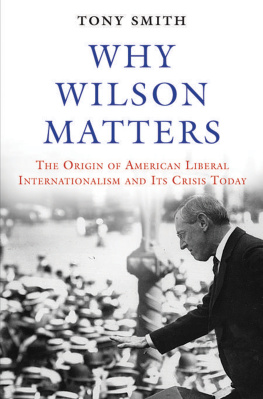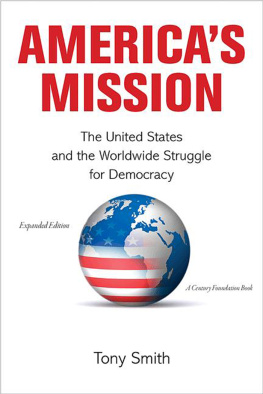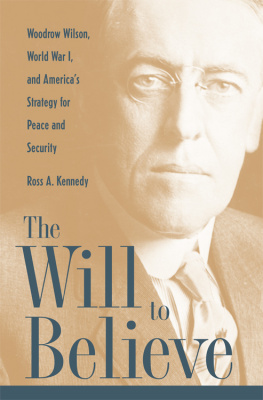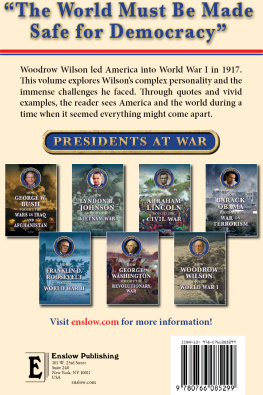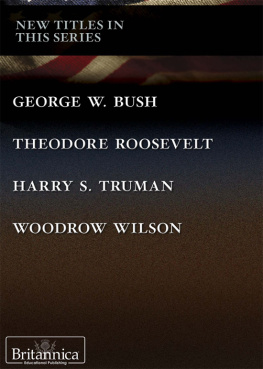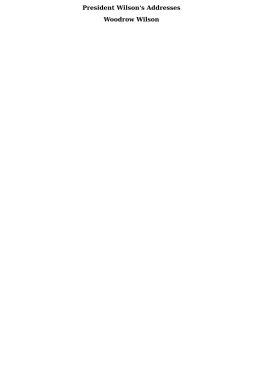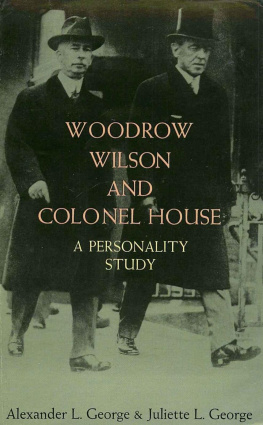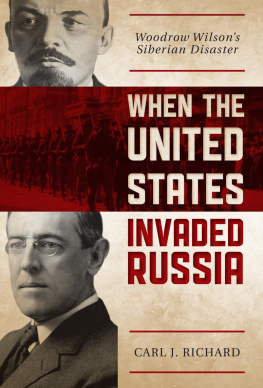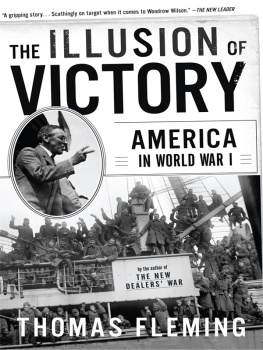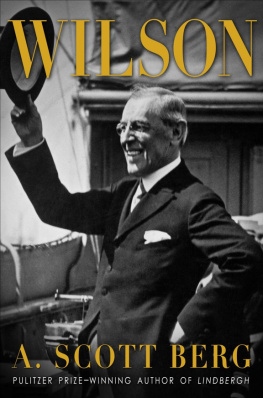WHY WILSON MATTERS
PRINCETON STUDIES IN INTERNATIONAL HISTORY AND POLITICS
SERIES EDITORS
G. JOHN IKENBERRY, MARC TRACHTENBERG, AND WILLIAM C. WOHLFORTH
Recent Titles
For a full list of books in this series see http://press.princeton.edu/catalogs/series/title/princeton-studies-in-international-history-and-politics.html.
Why Wilson Matters: The Origin of American Liberal Internationalism and Its Crisis Today by Tony Smith
Powerplay: The Origins of the American Alliance System in Asia by Victor D. Cha
Economic Interdependence and War by Dale C. Copeland
Knowing the Adversary: Leaders, Intelligence, and Assessment of Intentions in International Relations by Keren Yarhi-Milo
Nuclear Strategy in the Modern Era: Regional Powers and International Conflict by Vipin Narang
The Cold War and After: History, Theory, and the Logic of International Politics by Marc Trachtenberg
Americas Mission: The United States and the Worldwide Struggle for Democracy, Expanded Edition by Tony Smith
Liberal Leviathan: The Origins, Crisis, and Transformation of the American World Order by G. John Ikenberry
Worse Than a Monolith: Alliance Politics and Problems of Coercive Diplomacy in Asia by Thomas J. Christensen
Politics and Strategy: Partisan Ambition and American Statecraft by Peter Trubowitz
The Clash of Ideas in World Politics: Transnational Networks, States, and Regime Change, 15102010 by John M. Owen IV
How Enemies Become Friends: The Sources of Stable Peace by Charles A. Kupchan
1989: The Struggle to Create PostCold War Europe by Mary Elise Sarotte
The Struggle for Power in Early Modern Europe: Religious Conflict, Dynastic Empires, and International Change by Daniel H. Nexon
Strong Borders, Secure Nation: Cooperation and Conflict in Chinas Territorial Disputes by M. Taylor Fravel
The Sino-Soviet Split: Cold War in the Communist World by Lorenz M. Lthi
Nuclear Logics: Contrasting Paths in East Asia and the Middle East by Etel Solingen
Social States: China in International Institutions, 19802000 by Alastair Iain Johnston
Appeasing Bankers: Financial Caution on the Road to War by Jonathan Kirshner
The Politics of Secularism in International Relations by Elizabeth Shakman Hurd
Unanswered Threats: Political Constraints on the Balance of Power by Randall L. Schweller
Producing Security: Multinational Corporations, Globalization, and the Changing Calculus of Conflict by Stephen G. Brooks
Driving the Soviets up the Wall: Soviet-East German Relations, 19531961 by Hope M. Harrison
WHY WILSON MATTERS
The Origin of American Liberal Internationalism and Its Crisis Today
TONY SMITH
PRINCETON UNIVERSITY PRESS
PRINCETON AND OXFORD
Copyright 2017 by Princeton University Press
Published by Princeton University Press, 41 William Street, Princeton,
New Jersey 08540
In the United Kingdom: Princeton University Press, 6 Oxford Street,
Woodstock, Oxfordshire OX20 1TR
press.princeton.edu
All Rights Reserved
ISBN 978-0-691-17167-8
Library of Congress Control Number: 2016935594
British Library Cataloging-in-Publication Data is available
This book has been composed in ITC Galliard
Jacket image courtesy of Getty Images
Printed on acid-free paper.
Printed in the United States of America
1 3 5 7 9 10 8 6 4 2
For JDO
It is character and good principle, after all, which are to save us, if we are to escape disaster. It is for this that we love democracy: for the emphasis it puts on character; for its tendency to exalt the purposes of the average man to some high level of endeavor; for its just principle of common assent in matters to which we are all concerned; for its ideals of duty and its sense of brotherhood. Its forms and institutions are meant to be subservient to these things.
Woodrow Wilson, Democracy and Efficiency, 1900
Contents
INTRODUCTION
Know Thyself: What Is Wilsonianism?1
PART I
THE ESSENTIAL WILSON: WILSONS WILSONIANISM
CHAPTER ONE
Woodrow Wilson on Democracy Promotion in America31
CHAPTER TWO
Democracy Promotion through Progressive Imperialism65
CHAPTER THREE
Democracy Promotion through Multilateralism95
CHAPTER FOUR
Wilsons Wilsonianism130
PART II
WILSONIANISM AFTER WILSON
CHAPTER FIVE
Wilsonianism: The Construction of an American Vernacular147
CHAPTER SIX
The Rise of Neo-Wilsonian Theory182
CHAPTER SEVEN
From Theory to Practice: Neo-Wilsonianism in the White House, 20012017235
CONCLUSION
Reviving Liberal Internationalism276
Preface
W hen friends or colleagues have been kind enough over the last three years to ask me what Im working on, I have always answered, On Woodrow Wilson. Eyes usually glazed overexcept in the few cases when hostile comments were made: from the left, He was a racist, and from the right, He introduced state controls of the economy we have to abolish. Could the lack of interest have been related to ignorance? Newsweek reported in 2011 that 80 percent of the American public did not know who was president during World War I and thus presumably had no idea whatsoever of the impact Wilsons thinking has had over the last century on world affairs. As a result, even when Wilsonian policies were being adopted (in changed form, to be sure) on a massive scale as the basis of American foreign policy after 1939, recognition of his legacy was not widely expressed.
Certainly today, awareness of Woodrow Wilson is growing. April 2017 will mark the centennial of the American entry into the Great War. By 1918 discussions were beginning in earnest for the creation of the League of Nations, whose Covenant was voted by the victors in Paris in the spring of 1919. The centennial of the creation of the League is sure to be accompanied by international conferences reviewing not only the decisions reached in 19181919, but also the lessons American policy-makers drew as only a generation later they confronted the question of how to win the peace that would follow winning the war over the Axis powers in 1945. How can the spirit of Wilson not preside at these gatherings?
More recently, with the rise of the consciousness-raising campaign Black Lives Matter in 2015, sensibility to racial injustice in the United States has in due course turned to Woodrow Wilson, whose racism during his presidency
A greater familiarity with Wilsons name should not imply the existence of a deeper understanding of his policies and their repercussions on world affairs over the near-century since he left office, however. Hence, the title of this book: Why Wilson Matters: The Origin of American Liberal Internationalism and Its Crisis Today. Such a study is called for because the American liberal internationalist traditionWilsonianismhas been a basic element of American foreign policy over the last seventy-five years, contributing decisively to the greatest achievements in the Republics history in world affairs, yet contributing just as decisively to its greatest setbacks.

